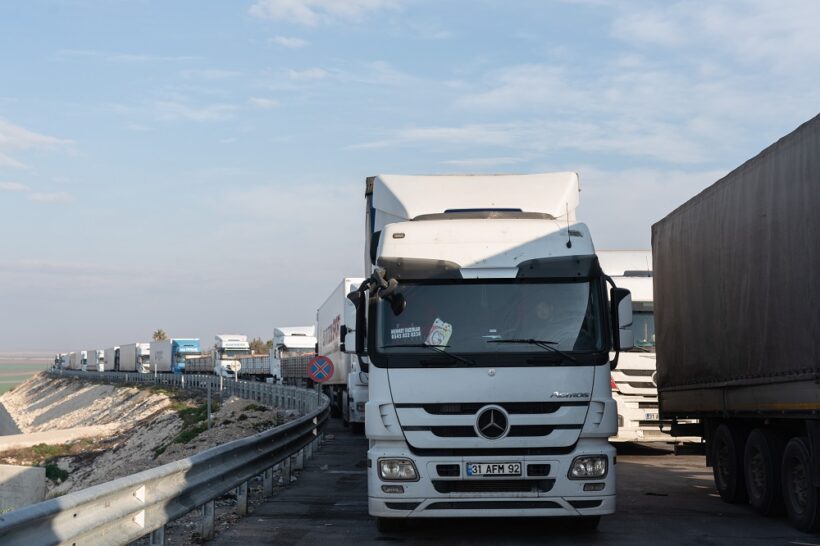Feb. 19, 2023 – A Médecins Sans Frontières (Doctors Without Borders) (MSF) humanitarian convoy of 14 trucks (see photo) entered northwestern Syria today from Turkiye through the Hammam border crossing.
This first convoy is carrying 1,296 tents for families (of at least five people) left homeless by the earthquake and as many winter kits to insulate them from the cold. Other MSF aid convoys, with medical and non-medical supplies, are expected in the coming days.
However, MSF warns, an urgent increase in the volume of supplies is needed to cope with the scale of the humanitarian crisis.
In the 10 days since the earthquake, the number of trucks crossing the border into northwestern Syria has been below the 2022 average. Present in the area for more than 10 years, MSF teams were able to respond immediately to the emergency.
“We emptied our emergency supplies in three days, donating nearly 12 tons (4,000 cubic meters) of surgical equipment and medicines to hospitals. Our teams provided support to health facilities in the area until stocks were exhausted,” says Hakim Khaldi, MSF’s head of mission in Syria. “But we have not seen any help from outside. Aid is coming in negligible quantities for the time being.”
MSF teams have identified huge unmet aid needs. Access to housing and decent sanitation are not guaranteed, especially given that the 180,000 newly displaced by the Feb. 6 earthquake are in addition to the two million people displaced by 12 years of war and already living in precarious conditions. MSF is currently providing assistance and medical support to people living in five shelters in northern Idlib, offering medical care and distributing tents, water, bread, blankets, mattresses and fire extinguishers. Activities to ensure continued access to health care for both earthquake victims and the general population will begin next week.
Humanitarian aid delivered to the region through the cross-border mechanism has not yet reached the average volume from before the earthquake. According to UN data, five days after the earthquake, only 10 trucks entered Syria through the Bab al-Hawa crossing, a UN-coordinated border point for humanitarian aid coming from neighboring Turkey.
From Feb. 6 to Feb. 17, a total of 178 truckloads of aid provided by six U.N. agencies crossed into northwest Syria through Bab Al-Hawa and Bab Al-Salama. In 2022, 7,566 truckloads of aid had entered northwestern Syria from Turkey, with an average of 227 trucks for the same period.
In addition, part of the 178 trucks that reached northwestern Syria were not part of the earthquake response, but rather pre-planned deliveries. Even considering 3 days of border closures, the current volume of trucks barely matches the humanitarian response before the disaster.
The MSF convoy’s crossing of the border was possible thanks to the support of Al Ameen, a Syrian NGO partner of MSF. The delivery was organized outside the UN’s cross-border humanitarian mechanism coordinated by WHO, which does not cover logistical equipment.
MSF is calling for an immediate increase in assistance to those affected by the earthquake in northwest Syria to address new humanitarian needs in addition to those already in the area. In particular, priority should be given to providing shelters and water and sanitation facilities, as well as medical supplies needed for post-operative care and to maintain continuity of care.










